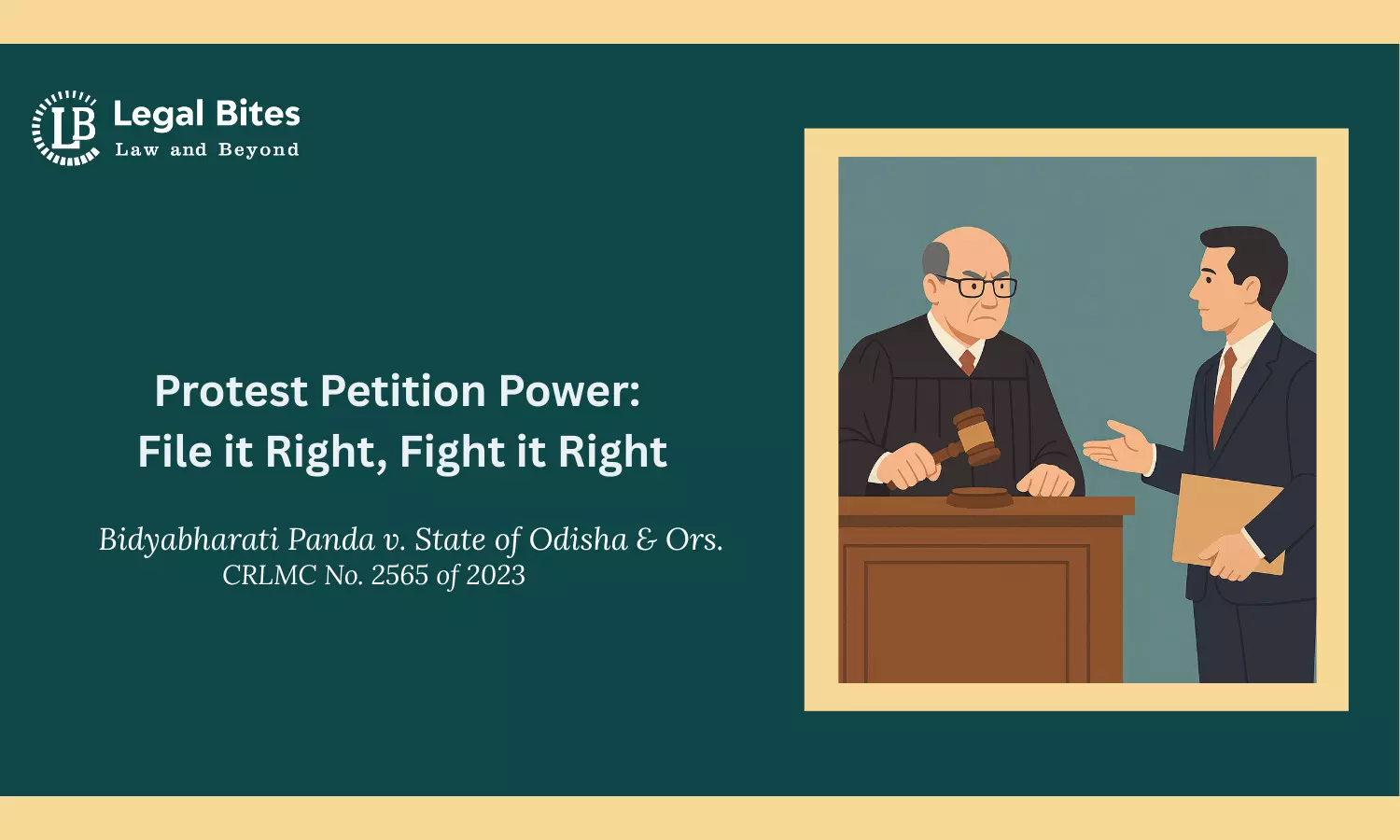Can a Magistrate Take Cognizance Based on a Protest Petition If a Prima Facie Case Exists?
A Magistrate can independently take cognizance if preliminary evidence supports the offence, even if the police report suggests otherwise.

In Indian criminal jurisprudence, the Magistrate's power to take cognizance of an offence even after accepting a final report from the police is a well-established principle. This position has once again been reaffirmed in the 2025 judgment of the Orissa High Court in Bidyabharati Panda v. State of Odisha & Ors., which dealt with the tragic death of a government officer and competing claims over whether it was an accident or a case of murder.
This article explores whether a Magistrate can take cognizance based on a protest petition, even after the police file a final report under milder sections, and if so, under what conditions such action is legally sustainable.
Background of the Case
The petitioner, Bidyabharati Panda, challenged the cognizance taken by the Magistrate under Sections 302 and 120-B of the Indian Penal Code (IPC) in relation to the death of her husband, a Forest Officer. According to her, the incident was an accident. The investigating agency, after a detailed inquiry by a Special Investigation Team (SIT), submitted a final report implicating her under Sections 285 and 304-A IPC (causing death by negligence).
However, the father of the deceased (informant) filed a detailed protest petition, alleging that the death was homicidal and premeditated. The Magistrate treated this protest petition as a complaint under Section 2(d) of the Criminal Procedure Code (CrPC), conducted an inquiry under Sections 200 and 202 CrPC, and eventually took cognizance under more serious charges—Section 302 (murder) and Section 120-B (criminal conspiracy).
Protest Petition: Concept and Legal Basis
A protest petition is not specifically defined in the CrPC, but it has evolved as a judicially recognized remedy available to a complainant who is dissatisfied with the police investigation. It allows the informant to contest the final report and submit fresh material or arguments.
The Hon’ble Supreme Court in Zunaid v. State of U.P., (2023) 14 SCC 576, observed:
“Even in a case where the final report is accepted and the accused are discharged, the Magistrate has the power to take cognizance of the offence on a complaint or a protest petition on the same or similar allegations…”
Hence, a protest petition can be treated as a complaint if it satisfies the definition under Section 2(d) CrPC—i.e., if it alleges commission of an offence and is presented to a Magistrate.
Magistrate's Power to Take Cognizance
Under Section 190 of the CrPC, a Magistrate can take cognizance of an offence in three ways:
- On receiving a complaint of facts which constitute such offence [Section 190(1)(a)]
- Upon a police report [Section 190(1)(b)]
- Upon information received from any person other than a police officer or upon the Magistrate’s own knowledge [Section 190(1)(c)]
Thus, even if the police conclude that no case exists under a serious offence like murder, a Magistrate is not bound by the police report. He or she can independently take cognizance on the same facts or additional material submitted via a protest petition.
Cognizance Based on Prima Facie Case: Judicial Standards
In Bidyabharati Panda, the Orissa High Court noted that the Magistrate recorded the statement of the complainant and three witnesses under Sections 200 and 202 CrPC before taking cognizance. The Magistrate found a prima facie case against the accused for murder and conspiracy.
The Court reiterated that:
"At the stage of Sections 203 and 204 CrPC, the Magistrate must only see whether a prima facie case exists. He is not required to weigh evidence as if conducting a trial."
This standard was emphasised in:
- Kewal Krishan v. Suraj Bhan, 1980 Supp SCC 499
- Dy. Chief Controller of Imports & Exports v. Roshanlal Agarwal, (2003) 4 SCC 139
- Bhushan Kumar v. State (NCT of Delhi), (2012) 5 SCC 424
Therefore, if a complaint or protest petition discloses sufficient grounds to proceed, the Magistrate can—and indeed must—take cognizance.
Addressing the Objection of “Double Cognizance”
The petitioner contended that a second cognizance under Sections 302/120-B IPC was barred, as the Magistrate had already accepted the police chargesheet under Sections 285 and 304-A IPC. This was argued as a case of "double cognizance" or "double jeopardy."
The Court rejected this argument, stating that the doctrine of double jeopardy under Article 20(2) of the Constitution or Section 300 CrPC applies only where a person is tried and convicted/acquitted. Mere filing of two complaints or cognizance under different sections does not amount to double jeopardy.
It held that:
"The mere fact that an earlier cognizance was taken under different sections does not automatically bar subsequent cognizance under more serious provisions, if supported by material."
Nature of the Protest Petition in This Case
The protest petition in Bidyabharati Panda included:
- A narrative of the offence
- Supplementary documents (medical reports, photos, affidavits)
- Names of proposed witnesses
- Pre-summoning evidence of three witnesses
The High Court concluded that the protest petition fulfilled the definition of a complaint under Section 2(d) CrPC. Thus, the Magistrate was within his rights to proceed under Sections 200 and 202 CrPC and take cognizance.
Application of Judicial Mind and Non-Mechanical Cognizance
One of the key questions before the Court was whether the Magistrate had merely rubber-stamped the protest petition or applied his mind judicially.
The High Court observed that:
- The Magistrate evaluated all material
- Preliminary evidence under Section 202 CrPC was recorded
- The order of cognizance showed judicial reasoning and cited “sufficient material”
Thus, the order could not be termed arbitrary or mechanical.
Can High Court Quash Such Cognizance Under Section 482 CrPC?
The petitioner sought quashing of the Magistrate's cognizance order using the High Court’s inherent powers under Section 482 CrPC.
However, the Court held that:
- Section 482 powers must be exercised sparingly
- When there are disputed questions of fact (e.g., accidental vs homicidal death), a full trial is more appropriate
- The petitioner has alternate remedies (e.g., seeking discharge)
Quashing was therefore deemed premature and inappropriate.
Procedural Compliance and Rule 20
The petitioner argued that Rule 20 of the General Rules and Circular Orders (Criminal) was violated since the protest petition was not formally converted into a complaint.
The Court dismissed this as a hyper-technical objection, stating:
“Substance must prevail over form… Courts should not be swayed by technicalities when prima facie material exists.”
Key Decision of the Court
Justice Sibo Sankar Mishra observed:
It is noted that while the petitioner's counsel has raised the issue of double jeopardy and multiple proceedings arising from the same facts, the law is well-settled that a Magistrate is not precluded from taking cognizance on a complaint even after accepting a final report, provided there is prima facie material to support the allegations.
This Court is also conscious about the present petition under Section 482 CrPC seeking quashing of cognizance at a very preliminary stage. The inherent power under Section 482 CrPC should be exercised sparingly and only in exceptional circumstances where continuation of proceedings would amount to abuse of process or where no prima facie case is made out.
The competing versions presented by both parties and the existence of disputed questions of fact make this an inappropriate case for not exercising such extraordinary jurisdiction at this stage, rather make it an inevitable case for trial to thrash out the disputed facts and test the competing version of the accused, informant and the prosecution.
Conclusion
The Orissa High Court’s judgment reinforces an important principle of Indian criminal procedure: a Magistrate has independent authority to take cognizance based on a protest petition if there exists a prima facie case—even after accepting a final report or earlier chargesheet.
In summary:
- Protest petitions can be treated as complaints if they fulfill the requirements of Section 2(d) CrPC.
- A Magistrate is not bound by the conclusions of the police.
- Prima facie satisfaction and application of judicial mind are key.
- Procedural objections must yield to substantive justice.
- At the cognizance stage, evidence is not scrutinized for conviction but only for initiation of process.
This judgment in Bidyabharati Panda v. State of Odisha serves as a critical precedent in reaffirming the principle that the pursuit of justice cannot be throttled by procedural finality or investigative conclusions if prima facie material exists. The role of the Magistrate as an independent judicial authority remains intact and vital in the criminal justice system.
Important Link

